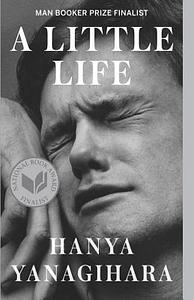Take a photo of a barcode or cover
challenging
dark
emotional
hopeful
sad
tense
medium-paced
Plot or Character Driven:
A mix
Strong character development:
Complicated
Loveable characters:
Yes
Diverse cast of characters:
Yes
Flaws of characters a main focus:
Yes
Loved this, hated this, everything in between. The longest I’ve ever taken to read a book
Started out really well, ended up being melodramatic, over-the-top, unrealistic and just plain stupid.
Well, finally finished it, and I genuinely felt angry afterwards.
Let me start with what works: Yanagihara is undeniably gifted with prose. Her writing has an elegant, almost intrusive quality that can make even the simplest scenes feel profound. When she's not drowning you in misery, there are moments of genuine beauty in A Little Life.
But I have a LOT of problems with this book, as it feels less like a novel and more like someone fed an AI with thousands of trauma memoirs and asked it to write the most devastating story possible. This book reads like a checklist of every horrific thing that could happen to a person. It's trauma porn masquerading as literary fiction.
The psychological realism is nonexistent. After decades of friendship, we're supposed to believe these four guys maintain their college dynamic with zero growth? Willem remains a perpetual golden retriever, Malcolm stays vaguely successful and uncommitted, JB continues being an inexplicable asshole that everyone tolerates for no apparent reason, and Jude never evolves beyond a traumatized child. Real friendships don't work this way, I've lost closer friends simply because life got busy, yet these characters cling to a toxic dynamic for decades.
The implausibilities pile up: Characters who never question, never grow, never change despite living full adult lives.
What bothers me most is how exploitative it all feels. Yanagihara uses mountains of sexual violence to avoid exploring genuine intimacy. She buries potentially meaningful conversations about friendship, adoption, and healing under such extreme suffering that you can't focus on anything else. It's manipulative, the shock value distracts from the fact that there's very little actual psychological insight here.
The book also has some truly problematic takes on mental health and therapy that frankly pissed me off. Mental illness isn't a terminal diagnosis requiring only palliative care. Unlike physical ailments, our minds can learn new patterns, develop coping strategies, and heal, I believe that's actually the beautiful thing about psychological resilience.
I think there's this misconception that suffering equals profundity, that the more miserable a book is, the more "important" it must be. But 800+ pages of unrelenting trauma without psychological depth or character development isn't profound, it's just exhausting. A Little Life. mistakes brutality for depth and trauma for insight
A Little Life is skillfully written torture, but that doesn't make it good literature. It desperately wants to be meaningful, but it confuses brutality with insight. Beautiful prose can't save a story that mistakes shock for substance.
Let me start with what works: Yanagihara is undeniably gifted with prose. Her writing has an elegant, almost intrusive quality that can make even the simplest scenes feel profound. When she's not drowning you in misery, there are moments of genuine beauty in A Little Life.
But I have a LOT of problems with this book, as it feels less like a novel and more like someone fed an AI with thousands of trauma memoirs and asked it to write the most devastating story possible. This book reads like a checklist of every horrific thing that could happen to a person. It's trauma porn masquerading as literary fiction.
The psychological realism is nonexistent. After decades of friendship, we're supposed to believe these four guys maintain their college dynamic with zero growth? Willem remains a perpetual golden retriever, Malcolm stays vaguely successful and uncommitted, JB continues being an inexplicable asshole that everyone tolerates for no apparent reason, and Jude never evolves beyond a traumatized child. Real friendships don't work this way, I've lost closer friends simply because life got busy, yet these characters cling to a toxic dynamic for decades.
The implausibilities pile up:
Spoiler
four friends from mixed backgrounds all becoming internationally renowned in their fields? A surgeon who somehow has unlimited time to make house calls for one patient's self-harm wounds without losing his license?What bothers me most is how exploitative it all feels. Yanagihara uses mountains of sexual violence to avoid exploring genuine intimacy. She buries potentially meaningful conversations about friendship, adoption, and healing under such extreme suffering that you can't focus on anything else.
Spoiler
When Willem dies in a random car crash, it felt less like devastating storytelling and more like Yanagihara playing god just to pile on more suffering.The book also has some truly problematic takes on mental health and therapy that frankly pissed me off. Mental illness isn't a terminal diagnosis requiring only palliative care. Unlike physical ailments, our minds can learn new patterns, develop coping strategies, and heal, I believe that's actually the beautiful thing about psychological resilience.
I think there's this misconception that suffering equals profundity, that the more miserable a book is, the more "important" it must be. But 800+ pages of unrelenting trauma without psychological depth or character development isn't profound, it's just exhausting. A Little Life. mistakes brutality for depth and trauma for insight
A Little Life is skillfully written torture, but that doesn't make it good literature. It desperately wants to be meaningful, but it confuses brutality with insight. Beautiful prose can't save a story that mistakes shock for substance.
dark
emotional
sad
tense
medium-paced
Plot or Character Driven:
A mix
Strong character development:
Yes
Loveable characters:
Complicated
Flaws of characters a main focus:
Yes
Beautifully written, but terribly sad story of Jude (brilliant but abused as a child and young adult) and Willem (farm boy turned famous actor
Okay I actually really enjoyed this overall, so much that I switched from audiobook to paperback halfway through. I did half expect to dislike it because it seemed like a lot of people do now but I loved so much of it and how it kept bringing me to tears. There were several points towards the second half though where I thought it got to be too much - at one point I put the book down for a few months because of how angry it made me. Towards the end I was flip-flopping on the book a lot, enjoying reading it for 50 pages then rolling my eyes at the excessive torture for another 50. I felt like the final chapters stuck the landing enough for me though that I came through it satisfied.
challenging
dark
emotional
inspiring
mysterious
reflective
sad
tense
slow-paced
Plot or Character Driven:
Character
Strong character development:
Yes
Loveable characters:
Complicated
Diverse cast of characters:
Yes
Flaws of characters a main focus:
Yes
challenging
dark
emotional
reflective
sad
tense
medium-paced
Plot or Character Driven:
Character
Strong character development:
Complicated
Loveable characters:
Yes
Diverse cast of characters:
Yes
Flaws of characters a main focus:
Yes
Devastating
Reading this was genuinely one of the most frustrating experiences I’ve ever had to endure. Beneath the veneer of solidly descriptive prose, which I will give Yanagihara credit for, lies 800 pages of some of the most truly horrific things I’ve ever seen put to a page. It’s not wrong to write about terrible things. But it’s baffling when that seems to be the end in itself.
Throughout the past week I’ve read and reread passages of this book obsessively, struggling to find the purpose that guided Yanagihara towards its creation. And I really am stumped to think about what message she was trying to tell us beyond “sometimes you’re born into the wrong lot in life, and it’s better to just give up.” I hate so much of what this book stands for. For how it constantly rehashes the same cycle of horrifying events in such a deeply irresponsible, self-indulgent and perverted way, over and over again. Because maybe that’s what my biggest gripe with this book was - beyond the objective tragedy of its meandering and aimless plot, it really is just so boring.
None of these characters here are developed to any meaningful extent beyond “someone who needs help” and “someone who wants to help but can’t”. And nothing about this book signaled any deeper than a desire on Yanagihara’s part to challenge herself to create the most terrible life possible for her protagonist. And that’s not at all worth adulation.
I get why people love this, I do. It’s an intense read specifically created to invoke strong emotions from us. But just because a book makes us gasp and wince and cry doesn’t make it good. Because why is it making us cry? And is it making us cry in a deserved way? Yanagihara pieced together a sequence of events that will make most people feel deeply gutted. But that’s not because what she did was tactful or artful or particularly poignant. She just leveraged narratives that were bound to make an average human cry, and bombarded you with it, almost like she was ceaselessly poking you with a stick until you gave her the reaction wanted, and then proceeded to poke you even further. I’m truly tired of people claiming this book is a great modern novel just because it’s the saddest book they read. Because it’s the saddest book I’ve read too from a quantitative standpoint. I’ve never had to read this many pages of brutal torture in a single reading experience in my life. But let’s not conflate that with quality and instead call this book out for what it is.
Throughout the past week I’ve read and reread passages of this book obsessively, struggling to find the purpose that guided Yanagihara towards its creation. And I really am stumped to think about what message she was trying to tell us beyond “sometimes you’re born into the wrong lot in life, and it’s better to just give up.” I hate so much of what this book stands for. For how it constantly rehashes the same cycle of horrifying events in such a deeply irresponsible, self-indulgent and perverted way, over and over again. Because maybe that’s what my biggest gripe with this book was - beyond the objective tragedy of its meandering and aimless plot, it really is just so boring.
None of these characters here are developed to any meaningful extent beyond “someone who needs help” and “someone who wants to help but can’t”. And nothing about this book signaled any deeper than a desire on Yanagihara’s part to challenge herself to create the most terrible life possible for her protagonist. And that’s not at all worth adulation.
I get why people love this, I do. It’s an intense read specifically created to invoke strong emotions from us. But just because a book makes us gasp and wince and cry doesn’t make it good. Because why is it making us cry? And is it making us cry in a deserved way? Yanagihara pieced together a sequence of events that will make most people feel deeply gutted. But that’s not because what she did was tactful or artful or particularly poignant. She just leveraged narratives that were bound to make an average human cry, and bombarded you with it, almost like she was ceaselessly poking you with a stick until you gave her the reaction wanted, and then proceeded to poke you even further. I’m truly tired of people claiming this book is a great modern novel just because it’s the saddest book they read. Because it’s the saddest book I’ve read too from a quantitative standpoint. I’ve never had to read this many pages of brutal torture in a single reading experience in my life. But let’s not conflate that with quality and instead call this book out for what it is.



